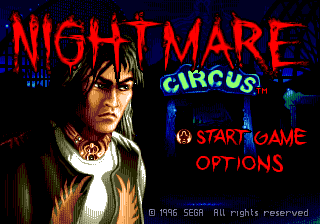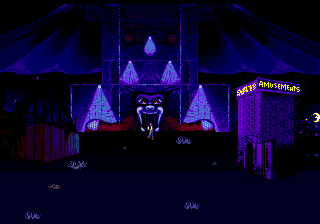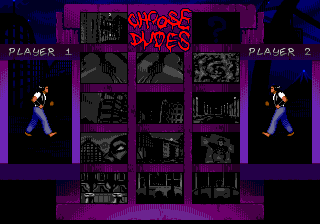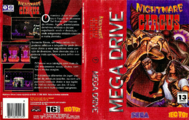Nightmare Circus
From Sega Retro
| Nightmare Circus | ||||||||||||||||||||
|---|---|---|---|---|---|---|---|---|---|---|---|---|---|---|---|---|---|---|---|---|
| System(s): Sega Mega Drive | ||||||||||||||||||||
| Publisher: Sega[1] (US), Tec Toy (Brazil) | ||||||||||||||||||||
| Developer: Funcom[2][3] | ||||||||||||||||||||
| Sound driver: GEMS | ||||||||||||||||||||
| Peripherals supported: Six Button Control Pad[4] | ||||||||||||||||||||
| Genre: Action | ||||||||||||||||||||
| Number of players: 1-2[5] | ||||||||||||||||||||
|
This short article is in need of work. You can help Sega Retro by adding to it.
Nightmare Circus is a Sega Mega Drive action beat-'em-up game developed by Funcom[2][9][1] and published by Tec Toy. Originally scheduled for a North American release in Autumn 1995[10] (later pushed back to December[11]), issues during development and the dwindling lifespan of the Sega Genesis resulted in Sega backing out of the project, and while nearing completion had its production formally cancelled. While left unfinished from a design standpoint, the game was stable enough on a programming level to be technically completable; eventually it was picked up for the Brazilian market by Tec Toy and saw an official boxed release there in June 1996. Six months later, Nightmare Circus did eventually see a North American release, broadcast via Sega Channel[12][13] in both the United States[7] and United Kingdom[8] as one of the system's more notable downloadable exclusives.
Boasting a complete lack of player direction or any indication on how to proceed, a highly complex but largely unexplained control scheme, and a notable amount of unfinished content, Nightmare Circus has become known for its modern reputation as one of the worst video games ever released. However, it also boasts a significant amount of well-considered features and a level of very visible passion that, while presented with striking inconsistency, instead notions its faults to the result of a development cycle cut short[14] - and the subsequent commercial release of a game that was almost-but not quite finished.
Contents
Story
| “ | When the Circo del Diablo first began setting up its tents on the edge of the city, people began to gather to purchase tickets for its opening night.
|
„ |
— BR manual[15] | ||
Gameplay
Raven enters Nightmare Circus seeking revenge for the death of his parents, and to free the souls captured by the Jester. Players begin outside each of the circus' three areas, and are able to choose which stage to tackle first. By fighting their way through the stage and defeating its respective boss, players acquire that boss' special ability. However, players can only hold one special ability at once, meaning the chosen route to the end boss must be considered carefully. Upon completion of these three stages, the door to the big top tent at the rear of the circus is unlocked, beginning the game's final stage.
Free to explore the different stages of the carnival at will, the game presents nothing in the way of direction during gameplay and players are left to themselves to creatively interpret the game’s visual cues to proceed. While some stages are fairly straightforward, others can only be completed by more obtuse methods, with the game as a whole having very little player feedback to indicate progression.
Mechanics
As a Native American shaman warrior[15], Raven boasts an extensive repertoire of both physical and psionic-based attacks (represented by the terms C-PSI and I-PSI; more commonly understood as HP and MP). When performing physical abilities, attacking with the most extended point of the animation - like the end of Raven's shoe in a kick - results in the most damage dealt. Using psionic abilities drains Raven's dedicated I-PSI meter, which can be refilled by grabbing the souls which escape defeated enemies.[16] Most enemies can also be defeated by draining their I-PSI in Spirit Warrior Mode, but will not spawn a soul. Raven can also expend I-PSI to heal himself.[16] If he takes enough damage, the game will end and return to the title screen. Fortunately, Nightmare Circus autosaves player progress, including which stages have been cleared, which bosses have been defeated, and which special abilities have been acquired.
Raven's health (C-PSI) is represented by the interior of the crouching red silhouette in the center of the HUD, and his psionic power (I-PSI) by the blue, oval-shaped background. The sphere being held by the red figure lights up when Spirit Warrior mode is active. Acquired special abilities appear to the left of the center HUD, and extra I-PSI reserves appear to the right. The empty spaces on the far sides of the HUD are reserved for on-screen enemies, with each represented by a blue sphere which dims as that enemy loses health.[17] When a second player is active, the HUD gains a separate health bar for White Eagle.
Nightmare Circus' features a difficulty scaling system which multiplies the damage and stun values used by enemy attacks, as well as the damage dealt by players' Spirit Warrior Projectile. This system begins at 100% and increases with every new stage completed. By the second stage, attack values have doubled to 200%, and by the fourth stage have tripled to a maximum 300%. By the sixth stage (the point at which players could have ended the game but instead opt to complete all stages), the scaling is reduced to 200%, with the seventh and final stage returning players to their starting point of 100%.
Game modes
- 1 Player: Raven fights through Nightmare Circus alone.
- 2 Player Cooperative: Raven and his twin brother White Eagle[18] fight through Nightmare Circus together, and are able to perform exclusive combination attacks. This mode doubles enemy health and spawns an additional pair of minibosses. If either player dies, the game returns to single-player mode and the living player is allowed to continue.
- 2 Player: The first player controls Raven, while the other controls on-screen enemies (with the ability to select from and spawn additional enemies.[18]) The first player tries to play the game as normal, while the second player tries to kill the other. MODE +
 , MODE +
, MODE + , and MODE +
, and MODE + select between enemy types, while MODE +
select between enemy types, while MODE + and MODE +
and MODE + select between different enemies in that type.
select between different enemies in that type. - 1 on 1 Combat: A one-stage deathmatch between either two human players, or one player and the computer, with combatants able to select from either Raven, White Eagle, or any of the game's bosses. Once a stage is cleared in any other game mode, it becomes selectable for 1 on 1 Combat. Additionally, defeating a boss and acquiring its special ability unlocks that ability's use in 1 on 1 Combat, with fighters allowed to choose from a single I-PSI ability each match.[18]
Playable characters
| Raven / White Eagle | ||||||||||||||||||||||||||||||||||||||||||||||||||||||||||||||||||||||||||||||||||||||||||||||||||||||||||||
|---|---|---|---|---|---|---|---|---|---|---|---|---|---|---|---|---|---|---|---|---|---|---|---|---|---|---|---|---|---|---|---|---|---|---|---|---|---|---|---|---|---|---|---|---|---|---|---|---|---|---|---|---|---|---|---|---|---|---|---|---|---|---|---|---|---|---|---|---|---|---|---|---|---|---|---|---|---|---|---|---|---|---|---|---|---|---|---|---|---|---|---|---|---|---|---|---|---|---|---|---|---|---|---|---|---|---|---|---|
|
HP: 2000 MP: 1000 Power: 88 | ||||||||||||||||||||||||||||||||||||||||||||||||||||||||||||||||||||||||||||||||||||||||||||||||||||||||||||
| Raven, the game's protagonist, is able to utilize a large number of both corporeal (C-PSI) and incorporeal (I-PSI) abilities. Incorporeal abilities drain the I-PSI meter, which initially has a maximum of 1000 I-PSI, with the attacks slowly changing color as I-PSI is depleted.[19] Defeating a boss permanently expands the I-PSI meter by an additional 1000.[20]. The C-PSI meter is permanently capped at 2000 health.
|
Stages
Players begin outside many of the carnival's various attractions, and can enter the Amusements, Roller Coaster, and Rides stages in any order desired. The Amusements stage is accessed through the building labeled "Amusements", the Roller Coaster stage is accessed through the rollercoaster at the carnival's far-left, and the Rides stage is accessed through the ferris wheel at the carnival's far-right. The Circus stage is accessible through the big top tent at the rear of the carnival, and initially presents players with a locked door guarded by two Warrior Puppets. Only by clearing the previous three stages can the door be opened, beginning Nightmare Circus' final stage.
Amusements
| House of Fun | |
|---|---|
| A funhouse-like maze with connecting rooms designed in a three-dimensional space. Raven can turn himself to a new cardinal direction by running to the edge of the screen, climb ladders to ascend to a new room, or enter trapdoors to descend a level. Different rooms feature distinct gimmicks, like one which swings back and forth while Raven is inside, and additional passageways can be revealed by attacking parts of the maze's walls. | |
| Hall of Mirrors | |
| A long hallway lined with mirrors where Raven encounters a large number of Looking Glass Men, duplicate images of Raven who step out of the mirror to fight him. | |
| Kaleidoscope | |
| A psychedelic rotating cylinder which holds a series of rotating pillars that appear to be pushing the room around. Raven proceeds by destroying these pillars, and must fight through the oncoming waves of Looking Glass Men. Additionally, Raven must contend with Doppelganger, a powerful Looking Glass Man with the ability to spawn more of his kind. |
Roller Coaster
| Roller Coaster | |
|---|---|
| A large roller coaster stage in which players can either run around the tracks on foot, or hop in one of the passing rollercoaster trains. Large levers placed along the tracks can be kicked to change the direction of incoming trains. Thankfully, the trains cannot damage players while rolling by. Riding a specific train will carry players to the Work Yard. | |
| Work Yard | |
| A maintenance area for the roller coaster trains. Raven spawns in front of a buffer stop which he can push forward to shield him from the flurry of sawblades thrown from an offscreen Wooden Man. After following the tracks to a decrepit workshed, Raven encounters the area's boss, Chainsaw. |
Rides
| Twin Wheels | |
|---|---|
| A pair of ferris wheels placed beside each other, facing the camera and traveling in opposite directions. Their gondolas can be jumped on and ridden, and there's deadly fire at the bottom of each wheel, ensuring players cannot stand still for too long. While keeping Raven from getting too close to the bottom of the wheels, Raven also contends with ghostly Roadies which can knock Raven off the gondolas. After a certain amount of enemies have been killed, the fire at the bottom of the wheels extinguishes and Raven can safely drop to the bottom, ending the stage. | |
| Wall of Death | |
| A dilapidated spinning rotor ride constructed of chainlinks fence and rotting wood which pushes Raven to its walls when it spins. This stage is infested with skinless dogs known as Crawlers which can attack Raven while the ride is spinning. Hitting the switch on one of the ride's metallic clown doors stops the spinning and allows Raven to enter. | |
| Dodgems Rink | |
| A decrepit bumper car rink with a dark, sickly mood. The stage itself is fairly open and straightforward, pitting oncoming waves of Roadies against Raven in a test of endurance. Surviving this spawns the boss, a magician named Helter Skelter. |
Circus
Enemies
| Roadie | |
|---|---|
|
HP: 180 MP: 200 Power: 70 | |
| A basic humanoid enemy wearing blue overalls and wielding a nailgun, and the game's most common enemy. While the damage dealt from its nailgun is relatively weak, it will attempt to strike players with a hammer when close. | |
| Wooden Man | |
|
HP: 303 MP: 0 Power: 39 | |
| A wooden robot only encountered in Work Yard, it has the ability to hurl powerful sawblades at players from a great distance. It is seemingly only encountered once, and although fragile is standing within aggro range of the stage's boss, Chainsaw. | |
| Jack in the Floor | |
|
HP: 100 MP: 400 Power: 58 | |
| A weak jack in the box-type enemy bearing sharp teeth, which frequently appears from the floor to bite at players. | |
| Toy Cannon | |
|
HP: 160 MP: 60 Power: 40 | |
| A weak miniature toy cannon which fire cannonballs at players. | |
| Tumbling Jack | |
|
HP: 180 MP: 80 Power: 176 | |
| An enemy very similar to Jack in the Floor, but with the ability to scale walls by slinking back and forth. | |
| Zeppelin | |
|
HP: 100 MP: 50 Power: 50 | |
| A weak miniature toy zeppelin which drops weak bombs on players. Getting caught in its propellor causes significantly more damage. | |
| Looking Glass Man | |
|
HP: 208 MP: 300 Power: 70 | |
| A mirror image of the player, able to perform many of the same attacks. Appears exclusively in Hall of Mirrors and Kaleidoscope, and while weak and easily dispatched, their large numbers can easily overwhelm players. | |
| Crawler | |
|
HP: 200 MP: 200 Power: 30 | |
| A demonic, emaciated dog found exclusively in Wheel of Death, where it aggressively crawls along the mesh fencing of the spinning wheel. | |
| Nasty Crawler | |
|
HP: 200 MP: 400 Power: 50 | |
| A skinless, tougher version of Crawler. | |
| Warrior Puppet | |
|
HP: 0 MP: 300 Power: 80 | |
| A highly-animated marionette of a tribal warrior with the ability to "fly" around the stage. Although not overly powerful, their small size and fast speed make them particularly challenging enemies, especially when presented in pairs. | |
| Maggot Man | |
|
HP: 80 MP: 80 Power: 40 | |
| A large grub-like maggot described by official material as a "man". Appearing exclusively in Maggot-Men Act, it plays into the stage's unique gimmick of being constructed from interconnected glass vials. Large numbers of Maggot Man randomly crawl between the vials, and have the ability to leap out and bite at players from virtually any floor, ceiling, or wall. While they can be defeated, the stage encourages players to proceed as fast as possible to avoid their bites. | |
| Bar Morph | |
|
HP: 200 MP: 400 Power: 80 | |
| A featureless, clay-like trapeze artist appearing exclusively in Body Snatching Act, performing on the trapeze. Once initially defeated, it curls into a ball for a brief period of time before returning to life. | |
| Pole Morph | |
|
HP: 10 MP: 400 Power: 176 | |
| A featureless, clay-like circus performer artist appearing exclusively in Body Snatching Act, sliding up and down the stage's poles. Once initially defeated, it curls into a ball for a brief period of time before returning to life. | |
| Ring Morph | |
|
HP: 50 MP: 800 Power: 90 | |
| A featureless, clay-like juggler appearing exclusively in Body Snatching Act, found on the stage's floor. Once initially defeated, it curls into a ball for a brief period of time before returning to life. | |
| Rope Morph | |
|
HP: 50 MP: 800 Power: 90 | |
| A featureless, clay-like juggler appearing exclusively in Body Snatching Act, found on the stage's tightrope. Once initially defeated, it curls into a ball for a brief period of time before returning to life. | |
| See-Saw Morph | |
|
HP: 10 MP: 800 Power: 208 | |
| A featureless, clay-like circus performer appearing exclusively in Body Snatching Act, found on the stage's seesaw. Once initially defeated, it curls into a ball for a brief period of time before returning to life. | |
| Trampoline Morph | |
|
HP: 20 MP: 800 Power: 208 | |
| A featureless, clay-like circus performer appearing exclusively in Body Snatching Act, found on the stage's trampoline. Once initially defeated, it curls into a ball for a brief period of time before returning to life. |
Bosses
| Chainsaw | |
|---|---|
|
HP: 5376 MP: 9472 Power: 160 Special Ability: Animate | |
| A large, muscular man wearing a Jason Vorhees-esque mask and wielding a chainsaw. | |
| Doppelganger | |
|
HP: 2560 MP: 500 Power: 88 Special Ability: Clone | |
| A powerful mirror image of the player, able to use many of the same attacks and creature further clones of himself. | |
| Helter Skelter | |
|
HP: 12288 MP: 14336 Power: 160 Special Ability: Haste | |
| A magician wearing a purple suit, wielding a magician's cane and able to throw electric projectiles. | |
| Ying Yang Brother | |
|
HP: 5376 MP: 9472 Power: 192 Special Ability: Puppeteering | |
| A pair of martial artists wielding deadly bladed fans, the Ying Yang Brothers are the bosses of The Ticket Office. Each brother is randomly hidden behind one of the wooden panels which make up the rotted billboard, and players are given no instructions for discovering them, resulting in The Ticket Office acting as one of the largest contributing factors to the game's "incompletable" reputation. | |
| Hydra | |
|
HP: 4096 MP: 8192 Power: 30 Special Ability: Hydrastrength | |
| An agile contortionist-gymnast with the ability to morph into a Maggot Man-like creature and escape into the floor of the boss arena. | |
| Body Snatcher | |
|
HP: 3072 MP: 16384 Power: 80 Special Ability: Bodysnatch | |
| A featureless clay circus performer with all the abilities of the Morph enemies. Like Morphs, he will revert into a clay ball once initially defeated, and must be defeated x more times to complete the fight. | |
| The Jester | |
|
HP: 20480 MP: 20480 Power: 240 Special Ability: Transform | |
| A large, red, horned demon which resembles traditional Christian depictions of the devil, and the final boss of Nightmare Circus. Jester has an enormous I-PSI pool, and its size during the final battle is dependent on the player's previous actions throughout the game. Using Jester Loan when possible slowly depletes his eventual I-PSI over the course of gameplay, while he absorbs the entirety of the remaining I-PSI of players upon their deaths. |
Tweaker
- Main article: Nightmare Circus/Tweaker.
Locked behind the password screen is the Tweaker, an extensive debug menu that allows minute alterations to things like hitboxes, variables, and even the game’s gravity - the range of Raven’s attacks can be extended, for example, or the capacity of his PSI meter increased. Entering a second password additionally expands this menu with a level select. Accessing the Tweaker again during gameplay will display an additional list of variables specific to the stage being played, so enemies and obstacles can have their variables adjusted at any time the player chooses.
Referred to by the game’s manual and advertising as U PROGRAM technology, and in-game as the Tweaker, the menu is extensively developed and properly labelled, and unlike the majority of debug modes was actually intended for use by players. The manual even details the menu’s control scheme and additionally offers potential ideas for players to alter gameplay, stating “the possibilities are nearly endless.”[25]
History
- Main article: Nightmare Circus/History.
Production credits
- Producer: Max Taylor
- Designer: Ricardo Pinto[26]
- Lead Programmer: Johan Andersson
- Lead Artist: Lars P. Anfinssen
- Asst. Producers: Dante Andersson, Trond W. Larsen
- Programmers: Martin Gram, Carsten Sørensen, Morten B. Ofstad
- Engine Programmers: Morten B. Ofstad, Carl Skârstedt
- Graphics Concepts: James Worall
- Artists: Torkell Bernsen, Colin McMahon, Tom Gjerde, Mikael Noguchi, Ernie Deakyne
- Music: Kurt Harland, Jim Hedges, Andy Armer
- Sound Effects: Kurt Harland, Brian Coburn, Kim Jensen
- Level Editor: Gard E. Rødahl
- Game Tweakers: Joel Breton, Ernie Deakyne, Ron Allen, Joe Cecchin, Marcus Montgomery
- Lead Tester: Joel Breton
- Asst. Lead Testers: Ernie Deakyne, Joe Cecchin, Tim Hess, Marcus Montgomery, Billy Martorana, Ron Allen
- Testers: Jack Amato, Alfred Dutton, Kim Rogers, Rick Greer, Jason Deguzman, John Amirkhan, Ed Ramirez, Tony Ciardella, Donovan Soto, Sherry Blevins, Kemrexx George, Chris Sur, Scott Crisostomo, Daniel Tyrell, Kenny Robinson, Bine Arceo, David Wood, Chris Lucich, Mark Griffin, Jeff Loney, Lance Nelson, Don Carmichael, Dermott Lyons, Mark Subotnick, Dave Paniagua, Joe Cain, Mark Paniagua, Joe Damon, Rob Prideaux, Maya De Campos, Sean Doidge, Jeremy Campbell, Jeremy Caine, Tai Huynh, Alex Barrerio, Jeff Silveira, Rolef Conlan, Matt Clerici, Anthony Desantis, Chris Johnson, Michael Ironside, Dave Asgharzadeh, Michael Douglas, Nathan Tan, Jeremy Wheat, The Big Top Mice, Zenon Thornton, Robbie Pasquini, Deserae Shanklin, Chris Baetz, Chris Cates, Charles Delay, Conner Morlang, Geoff Jones, Martin Broenkow, Roger Sommerville, George Sandoval, Ovanji Powell, Kenneth Chan, Tomothy McKnew, Christina Hurley, Six Button Bill, Toad Slepian, Sally Perlman, Joann Eastman, Pat Walsh, Phil Gamble, Geoffrey Meyers, Demian Kato, Andrew J Nolley, Darren Nagtalon, Abe Navarro
- Tools Programmers: Blue House Prod., Morten B Ofstad, Andre Johansen, Svein Aandahl, Eivind Eklund, Jesper Hansen
- Product Managers: John Garner, Bill Onderdonk
- Comic Liaison: Jennifer Hunn
- Production Asst.: Tormod Mansaker, Christian Almskog
- Special Thanks: Erik Gloersen, Jack Kristoffersen, Tommy Svensson, Joachim Barrum, Mark Miller, Terry Tang, Suzie Greene, Joyce Takakura, Larry Loth, Camp Winnarainbow
Magazine articles
- Main article: Nightmare Circus/Magazine articles.
Artwork
Physical scans
| Sega Retro Average | ||||||||||||||
|---|---|---|---|---|---|---|---|---|---|---|---|---|---|---|
|
| 65 | |
|---|---|
| Based on 2 reviews | |
Technical information
ROM dump status
| System | Hash | Size | Build Date | Source | Comments | |||||||||
|---|---|---|---|---|---|---|---|---|---|---|---|---|---|---|
| ? |
|
2MB | 1996-02 | Cartridge (BR) | ||||||||||
| ✔ |
|
4MB | 1995-07 | Odd EPROMs[29] | Page | |||||||||
| ? |
|
2MB | 1996-02 | Page |
External links
- Official website (1997) (Wayback Machine)
- Nightmare Circus fansite at The Prison in Galápagos (Japanese)
References
- ↑ 1.0 1.1 http://www.funcom.com/corporate/published/nightmare.html (Wayback Machine: 2000-08-18 05:47)
- ↑ 2.0 2.1 http://www.funcom.com/corporate/games.html (Wayback Machine: 1998-01-19 22:00)
- ↑ https://www.funcom.com/about-us/
- ↑ File:Nightmarecircus md br manual.pdf, page 7
- ↑ File:NightmareCircus MD BR Box.jpg
- ↑ http://www.sega.com/channel/now/4.html (Wayback Machine: 1997-06-05 18:45)
- ↑ 7.0 7.1 Sega Channel US schedule
- ↑ 8.0 8.1 Sega Channel UK schedule
- ↑ http://www.funcom.com/corporate/nightmare.html (Wayback Machine: 1998-01-19 23:05)
- ↑ 1995 Sega Product Catalog (US), page 38
- ↑ Sega Visions, "September 1995" (US; 1995-xx-xx), page 100
- ↑ http://www.sega.com/channel/now/4.html (Wayback Machine: 1997-06-05 18:45)
- ↑ Sega Channel
- ↑ https://nightmarecircus.proboards.com/thread/2/end (Wayback Machine: 2022-01-08 08:45)
- ↑ 15.0 15.1 File:Nightmarecircus md br manual.pdf, page 5
- ↑ 16.0 16.1 File:Nightmarecircus md br manual.pdf, page 12
- ↑ File:Nightmarecircus md br manual.pdf, page 14
- ↑ 18.0 18.1 18.2 File:Nightmarecircus md br manual.pdf, page 11
- ↑ 19.0 19.1 File:Nightmarecircus md br manual.pdf, page page=14
- ↑ File:Nightmarecircus md br manual.pdf, page 13
- ↑ https://nitta.sakura.ne.jp/brazil/circus/circus-chapter4.html
- ↑ 22.0 22.1 File:Nightmarecircus md br manual.pdf, page 10
- ↑ File:Nightmarecircus md br manual.pdf, page 9
- ↑ https://www.speedrun.com/nightmare_circus/guide/4pv8m#ch3Useful_Moves
- ↑ File:Nightmarecircus_md_br_manual.pdf, page 15
- ↑ http://www.angusm.demon.co.uk/AGDB/DBA1/Cyberco3.html (Wayback Machine: 2020-01-15 05:23)
- ↑ 1700 igr dlya Sega, "" (RU; 2001-xx-xx), page 211
- ↑ Tricks 16 bit, "Tricks Sega Gold 800 igr" (RU; 1998-03-20), page 130
| Nightmare Circus | |
|---|---|
|
Main page | Hidden content | Bugs | Development | Magazine articles | Reception | Region coding | Technical information | |
- Six Button Control Pad-compatible games
- 1-2 player games
- Sega Channel games (US)
- US Mega Drive games
- UK Mega Drive games
- BR Mega Drive games
- Mega Drive games
- 1996 Mega Drive games
- All 1996 games
- Mega Drive action games
- All games
- Stubs
- Pages with broken file links
- Credits without reference
- Games with known prototypes
- Old technical information
- Nightmare Circus
- Sega Channel games
- Articles needing images






